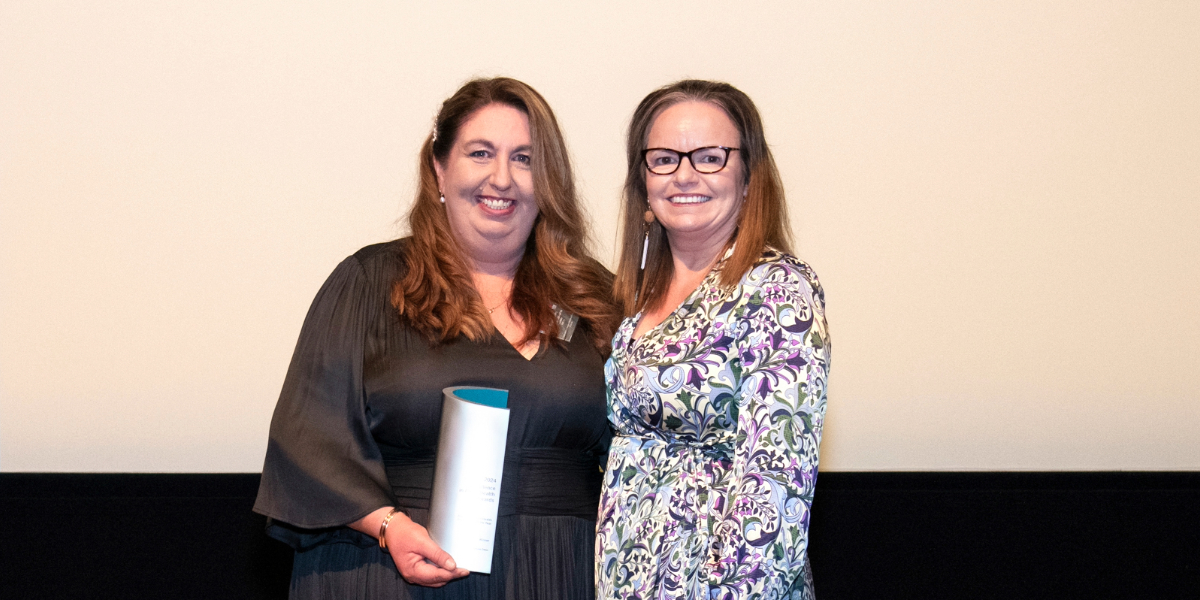Speech pathologist Simone Owen has been recognised for her work in helping First Nations people recover from stroke through yarning.
Born and raised in Tamworth, Simone has worked hard to build her career as a speech pathologist and a clinical trial coordinator for Hunter New England Health. Accolades for the Gomeroi woman grew with her success as the clinical trial coordinator of the ‘Yarning Up After Stroke Project’ with the Hunter Stroke Service, Hunter New England Local Health District. The project aims to improve the health and wellbeing of First Nations people after they had experienced a stroke, by applying the tradition of yarning as a method to discover real solutions for better stroke care.
“The project is culturally responsive, community lead, focused on what is important and what is needed,” Simone said.
“It has had quite an impact and moving forward I think it will have a bigger impact,” Simone said.
Simone recently won the Aboriginal Allied Health Professional of the Year at the 2024 Excellence in Allied Health Awards which were held in Sydney. Two other locals were also recognised in the awards: Diane Harris won the Allied Health Leader of the Year, and Isabella Sherman won the Early Career Allied Health Professional of the Year.
Simone feels this achievement is not hers alone; it belongs to all in her Aboriginal community who supported her efforts.
“The whole community, everyone that I have worked with, and that guidance and that trust and those relationships, it’s definitely put me where I am today,” Simone said.
Community led changes for better health outcomes
People living in regional and rural areas have poorer access to stroke rehabilitation and poorer outcomes following strokes due to their location. Simone says that through understanding what each individual’s experience of stroke was, they were guided by community to determine what could be done better.
“We have yarned with Aboriginal people who have had a stroke, to see what has worked and what hasn’t worked,” Simone said.
“And, using this information, we are developing a stroke care approach with community.”
The popular project has been extended from Tamworth and Quirindi to include Inverell, Moree, Narrabri, and Gunnedah, with plans to take it nationwide.
Simone said the project highlighted the importance of clinical yarning when you are working with Indigenous people.
“I have also been able to transfer my knowledge to my colleagues within John Hunter through clinical yarning training,” Simone said.
Simone is proud to share the knowledge entrusted in her by the Indigenous communities with other health professionals. Dr Heidi Janssen, Professor Chris Levi, Uncle Neville Sampson, Aunty Audrey Trindall, and Uncle Joe Miller, all play key roles within the yarning project alongside Simone.
She said Dr Janssen and Professor Levi were very passionate about their work, and she felt honoured to be working with them alongside the Gomeroi/Kamilaroi communities.
Hard work and proud heritage deliver results
Simone has taken great pride in her family’s heritage, admiring her nanna, Hazel Honess, as a proud and strong Gomeroi woman.
Outside of the office, Simone is also a mother of three – daughters, Ivee and Eva, and son, Spencer, and passing down her strong work ethic along her journey.
“I was working part-time, three children all in school, studying full time,” Simone said.
Simone entered university as a mature aged student, receiving a cadetship with Hunter New England Health in her second year of study, and has worked for them ever since. She currently works as the community speech pathologist for the Newcastle Lake Macquarie area, providing in-home care for patients who are house bound. Working with patients with a range of conditions, from general aging to more challenging conditions like motor neurone disease, she helps patients with everything from communication to swallowing.
“Seeing patients in their own homes, with their families, within the context of their daily lives, I can see what is important to them, and provide the service they need.”
“It’s just that real holistic view of someone’s wants and needs and their functioning.”
She said she absolutely loves her home visits and getting to know her patients, know their stories and build relationships.
“It’s such a special thing to allow someone to know your story,” Simone said.
Top image: Simone Owen (L) receiving her Aboriginal Allied Health Professional of the Year Award from Nicole Turner, Chairperson for Indigenous Allied Health Australia (IAHA). (Supplied)
Something going on in your part of the region you think people should know about? Send us a news tip or email newsdesk@netimes.com.au.

